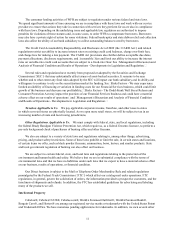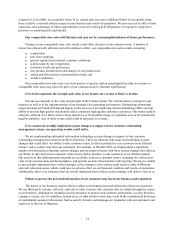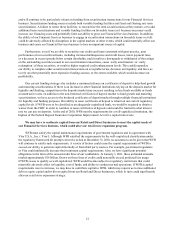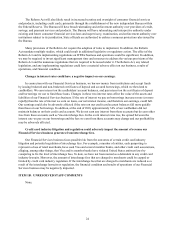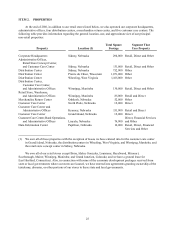Cabela's 2010 Annual Report Download - page 25
Download and view the complete annual report
Please find page 25 of the 2010 Cabela's annual report below. You can navigate through the pages in the report by either clicking on the pages listed below, or by using the keyword search tool below to find specific information within the annual report.15
If we cannot successfully implement our retail store expansion strategy, our growth and profitability
would be adversely impacted.
We continue to seek additional locations to open new retail stores. Our ability to open new retail stores
in a timely manner and operate them profitably depends on a number of factors, many of which are beyond our
control, including:
• our ability to manage the financial and operational aspects of our retail growth strategy;
• our ability to identify suitable locations, including our ability to gather and assess demographic and
marketing data to determine consumer demand for our products in the locations we select;
• our ability to negotiate and obtain economic development packages with local and state governments
where our new retail stores would be located;
• our ability to negotiate favorable lease agreements;
• our ability to properly assess the profitability of potential new retail store locations;
• the availability of financing on favorable terms;
• our ability to secure required governmental permits and approvals;
• our ability to hire and train skilled store operating personnel, especially management personnel;
• the availability of construction materials and labor and the absence of significant construction delays or
cost overruns;
• our ability to provide a satisfactory mix of merchandise that is responsive to the needs of our customers
living in the areas where new retail stores are built;
• our ability to supply new retail stores with inventory in a timely manner;
• our ability to properly assess operational and regulatory challenges involved in opening and successfully
operating retail stores in Canada;
• our competitors building or leasing stores near our retail stores or in locations we have identified as
targets for a new retail store; and
• general economic and business conditions affecting consumer confidence and spending and the overall
strength of our business.
We may not be able to sustain the growth in the number of our retail stores, the revenue growth historically
achieved by our retail stores, or to maintain consistent levels of profitability in our Retail business, particularly
as we expand into markets now served by other large-format sporting goods retailers and mass merchandisers.
In particular, new retail stores typically generate lower operating margins because pre-opening costs are fully
expensed in the year of opening and because fixed costs, as a percentage of revenue, are higher. In addition,
the substantial management time and resources which our retail store expansion strategy requires may result in
disruption to our existing business operations which may decrease our profitability.
The slower pace of our retail store expansion may negatively impact our revenue growth and profitability.
The opening of new retail stores has contributed significantly to the growth of our merchandising revenue. As
part of our efforts to improve retail operations, and in light of the challenging macroeconomic environment facing
retailers, we made the strategic decision to slow the pace of our retail store expansion. We opened eight new retail
stores in 2007, two new retail stores in 2008, one new retail store in 2009, and one new retail store in 2010. In 2011,
we expect to open two new retail stores in the United States and one new retail store in Canada. The slower pace of
our retail store expansion may negatively impact our revenue growth and profitability.
Retail store expansion could adversely affect the operating results of our Retail business and reduce the
revenue of our Direct business.
As the number of our retail stores increases, our stores will become more highly concentrated in the geographic
regions we serve. As a result, the number of customers and related revenue at individual stores may decline and the
average amount of sales per square foot at our stores may be reduced. In addition, as we open more retail stores and
as our competitors open stores with similar formats, our retail store format may become less unique and may be less
attractive to customers as tourist and entertainment shopping locations. If either of these events occurs, the operating
results of our Retail business could be adversely affected. The growth in the number of our retail stores may also draw
customers away from our Direct business, which could adversely affect our Direct business revenue.








